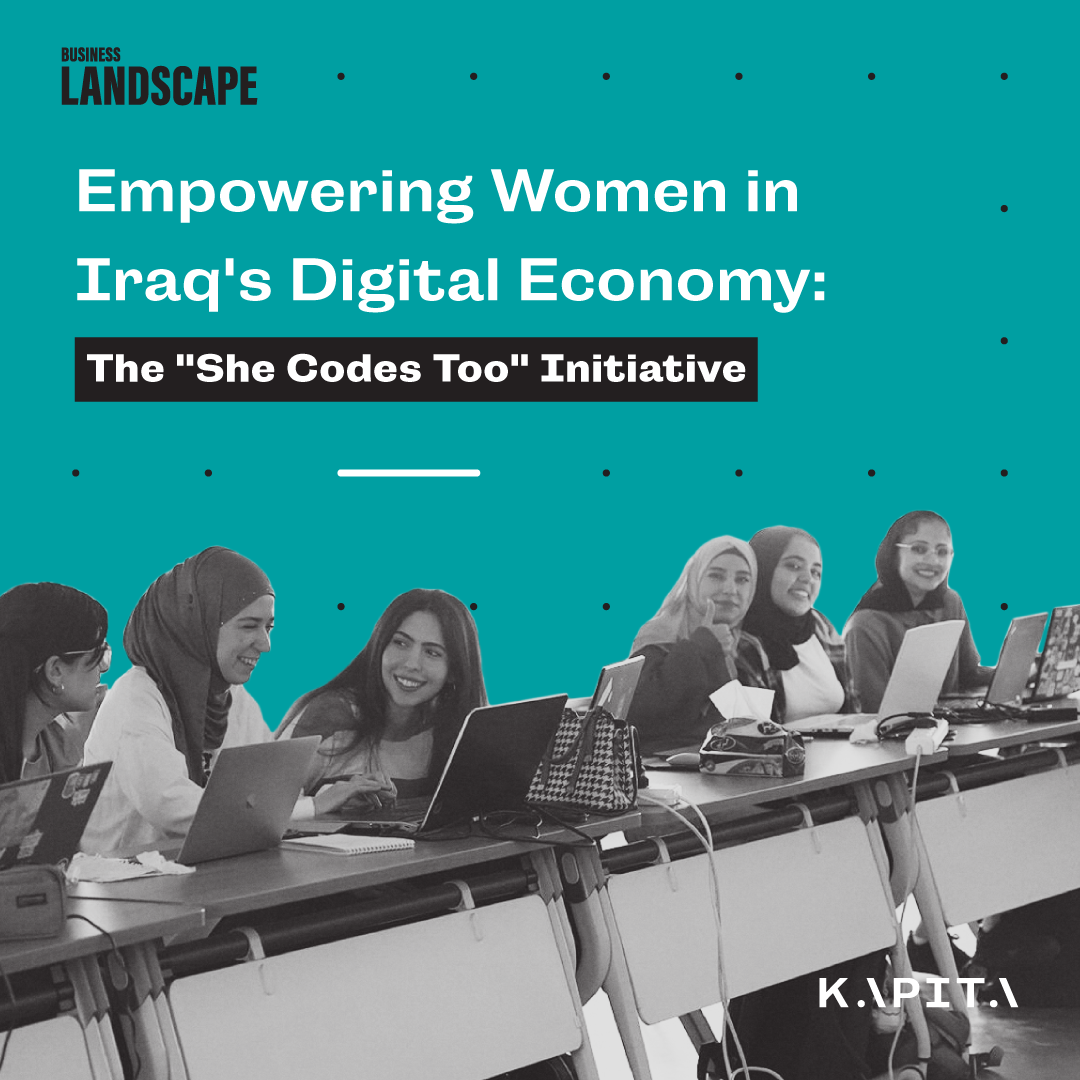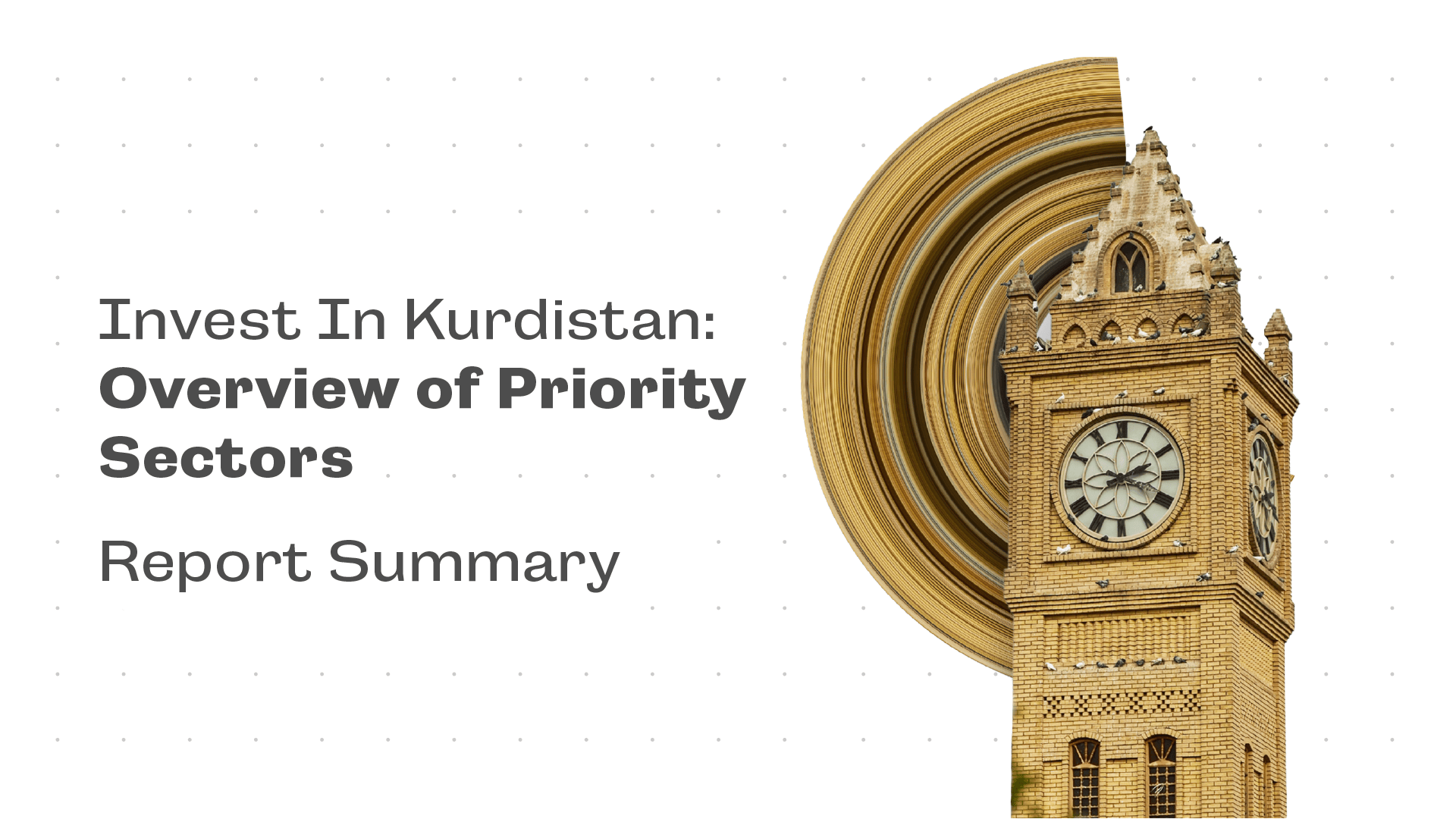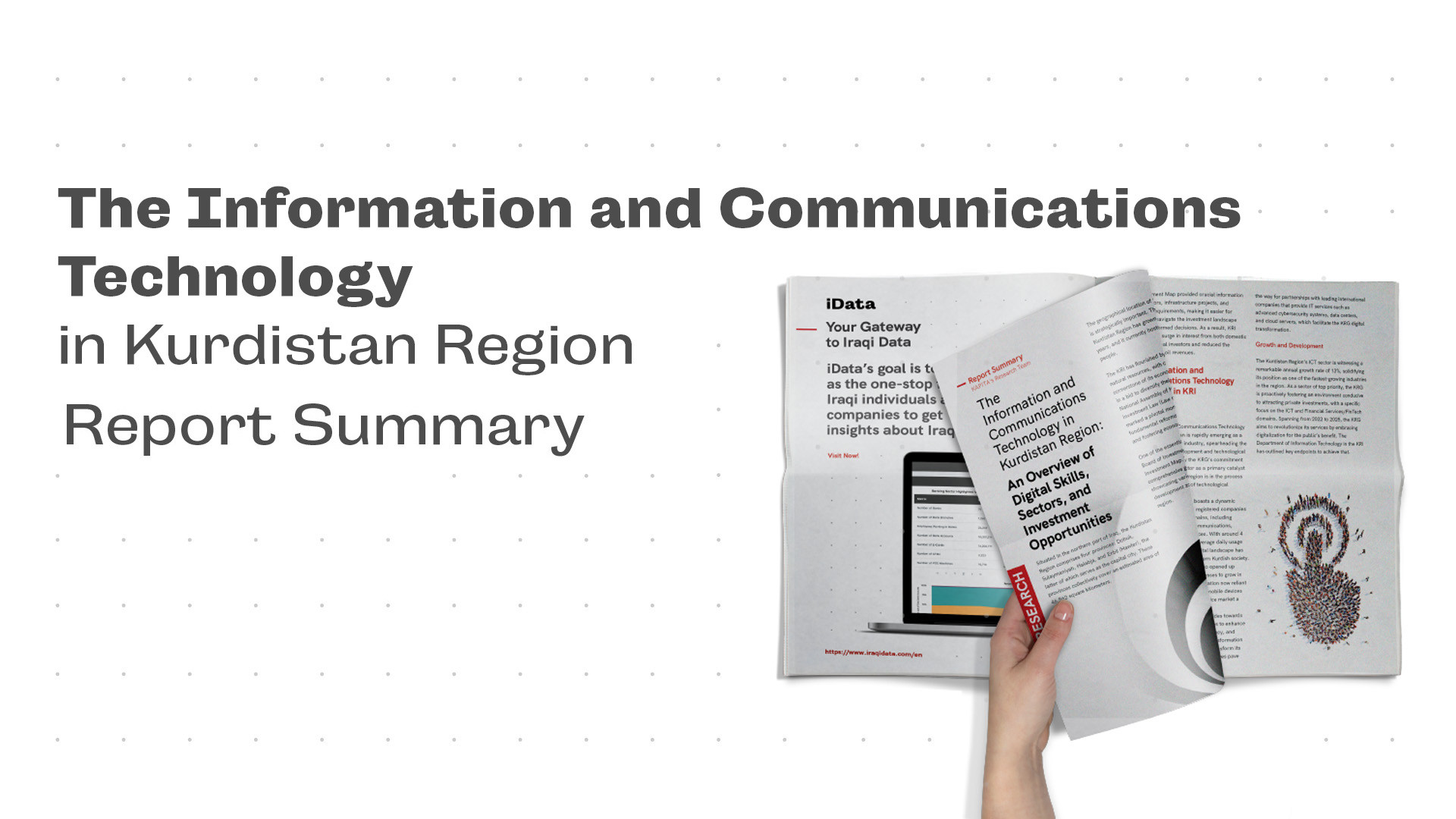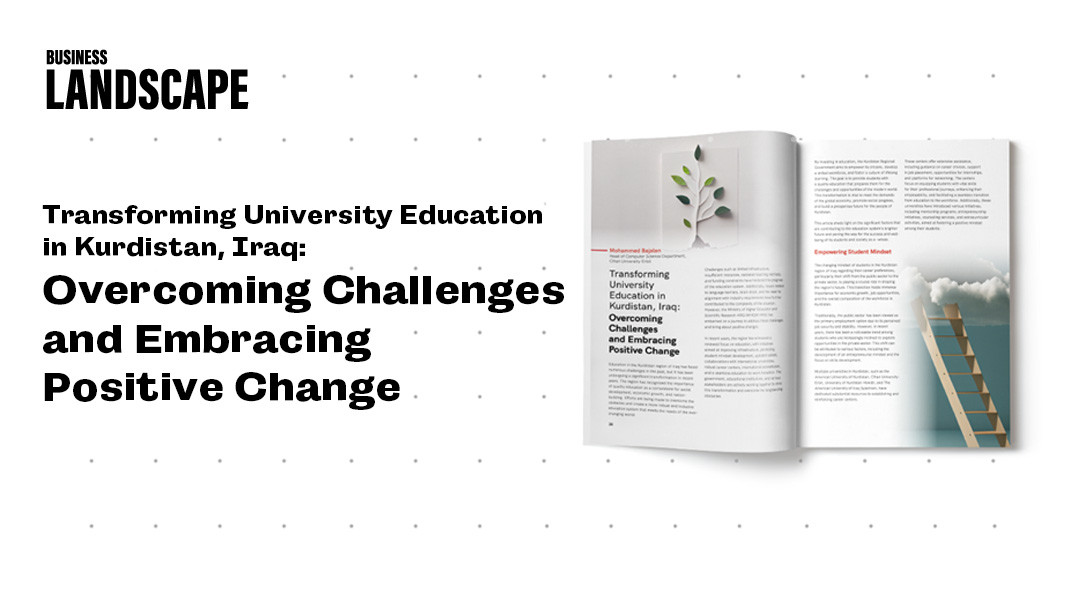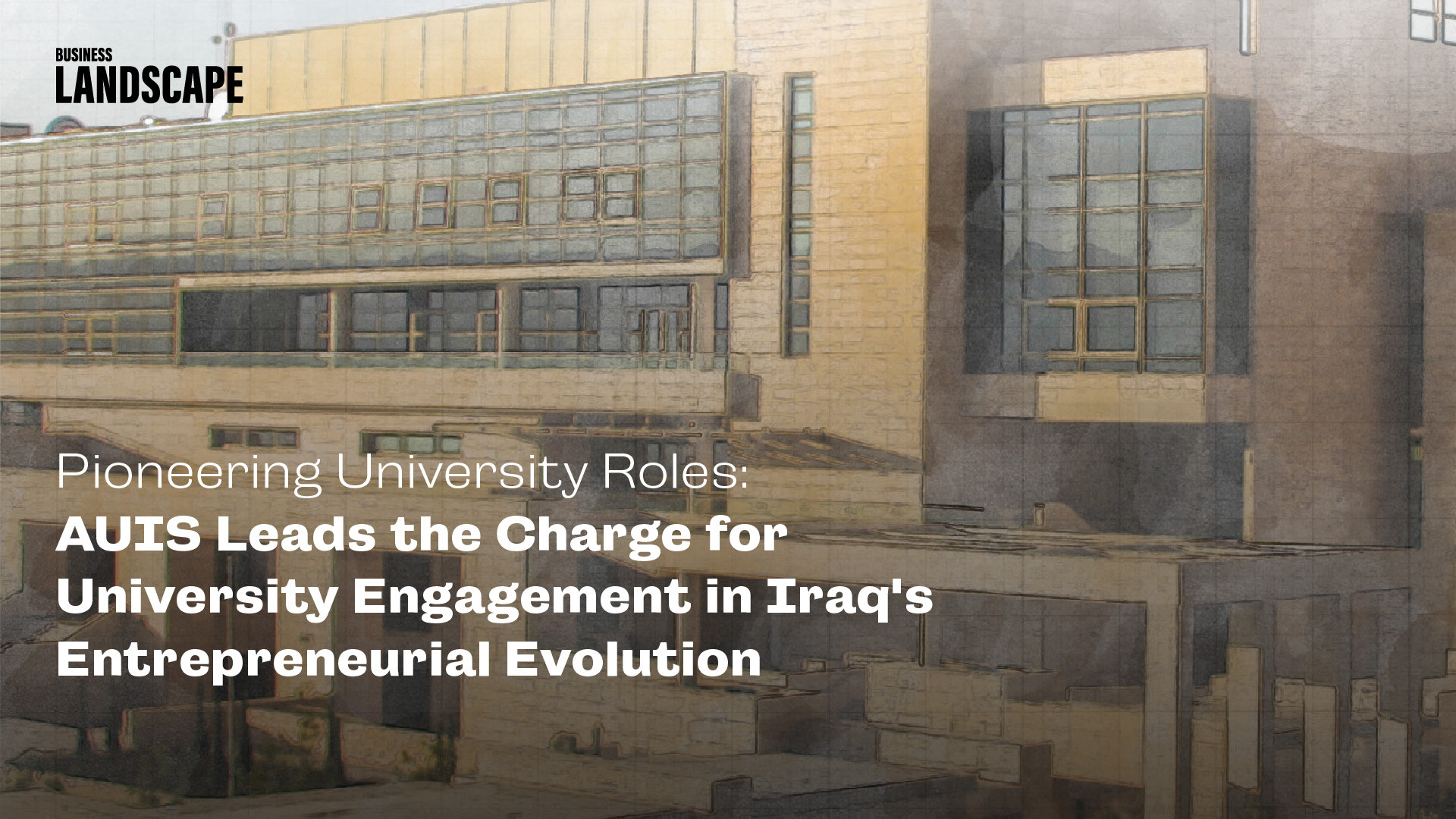Shaping Tomorrow: Preparing Iraqi Youth for the Job Market
AbdulSalam Medeni
Chief Executive Director, Rwanga Foundation
"A nation that does not think of its youth, is a nation contemplating suicide." It is an engraved belief that the youth are the leaders of the future. If we fail to engage and consider the youth in the current process of building tomorrow, the future will have certain characteristics that the youth have not contributed to. Therefore, they will lack the necessary knowledge to lead it. The youth must actively participate in the building process. Iraq has transformed from a socialist, one-party economy to a form of pluralism and a path closer to the definition of capitalism. However, the system still operates according to a socialist mindset and pre-2003 laws. The reality has changed, yet people's expectations from the government have not. From the people’s perspective, the government remains the source of employment for youth and graduates.
The Gap between the Iraqi Education System and the Labor Market Requirements:
Universities graduate employees, not entrepreneurs! The engines that can stimulate the market have their problems. Is there a gap between the job market and the skills of the youth? Undoubtedly, it exists. The global labor market's requirements constantly change. According to the 2016 Davos report, which introduced the term "Fourth Industrial Revolution," societies that fail to embrace technology will suffer from poverty in the next 100 years. Similar to what happened during the Industrial Revolution in the 1800s, the countries that did not join the Industrial Revolution from the beginning were impoverished in later years because they were not involved in the global decision-making process. The present educational curriculum does not prepare young people for the current job market, which poses significant challenges. Globally, in the aforementioned Davos report, it is said that 65% of primary school students in 2016 will take part in the labor market and engage in a range of jobs of which we have little knowledge about their nature and characteristics.
Our universities and educational curricula still produce employee-mentality graduates based on the assumption that we are producing individuals for office jobs. As a result, vocational education has significantly declined, and the curricula do not focus on entrepreneurship or job creation. The curricula are not designed to equip students with critical thinking skills, creative thinking, and other analytic and problem-solving skills, as they are theory-based rather than project-based. In the best-case scenarios, students may acquire knowledge without gaining skills and experience. In summary, the education system is not designed to prepare students for the private sector. The private sector ecosystem, in general, is not prepared to attract entrepreneurs, let alone to flourish.
The labor market has particular specifications, multiple requirements, and specific skill sets that are needed for specific career paths. They cover a wide range of skills, such as computer skills, English language proficiency, communication skills, entrepreneurial mentality, critical thinking, marketing, and creative problem-solving. Even in the field of business administration, the curriculum fails to prepare students for a dynamic job market.
Furthermore, Iraq lacks the societal mechanisms that provide loans or grants. Currently, loans and grants come from external sources, and recently, the Central Bank of Iraq has started implementing classic approaches to support. It is a good start, yet with many challenging layers because the ecosystem, including the legal framework, is not ready and not supportive. The current leadership, which is responsible for creating young leaders in the twenty-first century, still has a twentieth-century mentality. We do not have a banking system that offers loans or helps businesses recover their loans, and additionally, we lack mechanisms to decide the small and medium-sized companies that are eligible to obtain the loans.
Alarming Indicators of the Current Job Market
Few signs are evident that certain actions are steering us off the right path, and these include:
Legal Barriers Hampering the Modern Job Market Needs:
The government is unable to employ graduates, stimulate the job market, or establish clear policies and guarantees for the private sector through which young people can seek secure employment opportunities. When it comes to social security, for instance, the recently enacted Labor and Social Security Law requires non-governmental nonprofit organizations, which accommodate a significant portion of young people through developing skills and providing employment opportunities, to pay 12% of employees' salaries as social security for each employee. The social security ratio is 17%, with 5% paid by the employee and 12% by the institution. However, for private sector companies, this is understandable since they are profit-oriented entities, and that law does not align with the nature of NGOs. It seems that decision-makers are unaware of these consequences, which will force NGOs to suspend their operations or submit false reports. For example, organizations might resort to deducting the whole 17% directly from employees' salaries. This highlights the fact that the current system or mindset that formulates and makes decisions is unaware of the new ideas and institutions that have emerged and the changes that have occurred in Iraq.
The Burden on Iraq’s Fiscal Budget:
The increasing number of youth graduates has led to a growing demand for the creation of sustainable employment opportunities. This demand has also resulted in social unrest and ignited the protests, as witnessed in 2019, though it was not the first time the public anger over the lack of services and jobs had exploded into protests. However, the government’s response has consistently remained the same: pacifying the public by creating more jobs in the public sector, thus increasing the burden on the fiscal budget. Among other indicators, approximately 1.5% was allocated to the Ministry of Higher Education, 5.9% to the Ministry of Education, and 3.74% to the Popular Mobilization Forces in the 2023 fiscal budget. It is evident that the focus is more inclined towards military security than other sectors. Unfortunately, significant sectors like agriculture, which have the potential to create many job opportunities, are often neglected, with the Ministry of Agriculture's share is 0.95% of the fiscal budget. The priorities need to be shifted towards more sustainable economic development and job creation, and this can only achieved through better governance and diversification of the country’s resources.
The Root Causes of the Education System’s Inadequacy
There are many aspects that would come into play when trying to answer this question, and they are as follows:
Lack of Long-term Vision:
The current governance is focused on responding to emergencies and a fire-distinguishing approach rather than a long-term vision. We need a long-term strategic plan based on a vision because it takes more than 12 years for a final product (student) to enter the university and 16 years to enter the job market. Subsequently, the outcome becomes observable. None of the successive governments has had such a vision or carried out the work of the previous one. The absence of a specific vision in the curriculum stumbles and fails to reach a solid foundation.
Teaching Staff:
In every country that aspires to progress, the student becomes the focus of the educational process, not the teacher. The goal should not be: did the teacher deliver the topic? It has to be: Did the student get the topic? Has the student developed skills? Teachers adhere to traditional methods of explanation and teaching. The teachers are not keeping pace with the reality of global education and the fast changes that are happening in the fields of education, leadership, information, and technology. Moreover, the educational objectives of the class in the teachers’ manuals are based on explaining the material, which, in today’s world, access to information on a grand magnitude, the know-how should be the focus instead. Students’ understanding needs to be considered. The evaluation and follow-up mechanisms are very traditional, and the curricula are not keeping up with the changes. The curricula lack discussions and the exchange of opinions among students. In addition, until now, technology has not been well invested to support the learning and education processes in general.
Examination Methodology:
The entire educational curriculum relies heavily on exams. The higher the grade, the smarter the student is considered! The system is driven by theoretical education, exam grades are the criteria and not the student's participation, the research they present, or the discussion. The entire process is based on exams and grades, including the selection of a college major, rather than considering students' preferences, interests, skills, and competencies. The job market and job distribution, on the other hand, also follow the same methodology. This becomes a major problem because the labor market depends on the senior year of high school exam results, which itself is a method to measure the memorization ability of students. Memorization, according to Bloom's Taxonomy Pyramid, is the lowest in the hierarchical ordering of cognitive skills.
Educational Problems that are Specific to the Kurdistan Region
Kurdistan Region suffers from a lack of schools. Hundreds of schools should be built, and hundreds need to be renovated. In some schools, there is a shortage in the number of classes and other equipment. Vocational education is neglected. Education still heavily relies on lectures rather than interaction, two-way communication, and sharing experiences. The education system lacks infrastructure. The situation is slightly better in private schools than in public schools. However, the majority of students attend public schools. Hence, it would be a priority to improve public education instead of relying on private education.
Private Schools:
There are good outcomes through private schools in terms of learning environment, English language proficiency, and skill acquisition, yet this comes at a cost by creating a social class in Iraqi society. Higher-income families have access to good schools and skill development opportunities. The same applies to non-diligent students who, through money and influence, can obtain education in private schools and universities in the majors of their choice. This paves the way for a large part of society to create a negative dynamic based on money and accessibility to power. This brings up the question: Is there any social justice in education? This is one of the points that the political, cultural, and educational elites must discuss. When the education system is based on exam grades, and those with the previously mentioned tools can overcome it, it creates class divisions in society. This does not translate into social justice, which may lead to negative tension in the future.
Poor Job Market Distribution:
Private school education also has an impact on the job market, as it indicates the social status and income in the future. In the agricultural era, those born into low-income families remained within their social class and had a fixed ceiling of ambition. However, the Industrial Revolution changed these concepts. For the first time in history, there was an opportunity for an individual from an unprivileged family working in a factory to change the reality of their economic and social status. The question here is whether these opportunities are available to all Iraqis if they have the necessary skills. Up to this moment, there are challenges, and skills are not the primary requirement. Clout, nepotism, and political, religious, and sectarian affiliations are often the keywords to determine the success of individuals and how much of the ladder they can climb.
Youth Skill Development and Integration into the Job Market
There are two main components that together can achieve the goal of youth skills development and help integrate them into the job market:
Decision-makers:
The decision-makers have a great responsibility to integrate the youth into the job market in a manner that acknowledges their potential and actively cultivates it. It is the duty of influential figures to adopt a proactive stance rather than a reactive one. This transition necessitates a well-defined vision that resonates with the evolving needs of both the youth and the employment sector. A clear focal point must be established, aligning educational and vocational systems with the demands of the contemporary workforce. Such an approach will not only empower the youth with relevant skills but will also alleviate the gap between academia and practical application.
Self-taught Youth:
Taking personal responsibility is essential for the youth. Today, more than ever, young people have more access to learning opportunities through YouTube, websites, TV series and shows, and even social media platforms that help them develop their English language skills, computer skills, and soft skills. For example, in the opening keynote for HITEX, an annual event that introduces technology to Iraqi society, managed in partnership between Red Eagle company and Rwanga Foundation, Rwanga Foundation’s speech was delivered by a talented sixteen-year-old, 10th-grade student. This talented young person has skills in various fields of technology as well as possessing marketing skills, a strong personality, and English language proficiency. This shows that with dedication, young people nowadays can seize opportunities and reach new heights.
What Rwanga Foundation Is Trying to Do
Rwanga Foundation is striving to raise a generation with high-quality education who are self-aware, positive, proactive, and collaborative. We have different initiatives to achieve this vision. Specifically for preparing youth for the job market, the goal is to educate and qualify them to shift their mindset, expose them to new values, and train them on essential skills needed in the job market. It is a collaborative effort with Career Development Centers (CDCs) to develop specific skills, such as successful interviewing, computer literacy, financial management, and more. We have helped more than 13,475 individuals find jobs and showcased the competencies of more than 154,218 individuals. In addition, more than 112,886 people have benefited from our capacity training programs and technical and vocational education and training.
The Rwanga Foundation also provides grants aimed at business ideas, mainly in the technology field. These grants are offered either by companies or international organizations to a set of ideas that require specific grants. We also have the Annual Rwanga Awards event, which is shedding light on the skilled and talented youth nationwide. It also helps to improve and foster the potential of young entrepreneurs across 12 different fields, such as scientific inventions, entrepreneurship, software development, and graphic design, to name a few. We have many success stories that have crossed borders to other countries, and in total, we have supported more than 636 businesses.
In addition to the aforementioned, we offer support to established businesses. Agribusiness is one of the main targeted segments. For instance, we helped some agribusinesses develop products that met the standards of the European Union, which enabled them to be integrated and exported to the European market. We also provided training and support to agriculture and livestock businesses to develop and increase productivity.
Rwanga Foundation implements job fairs and provides internship opportunities in coordination with the business sector, and offers opportunities and apprenticeships with INGOs. Thousands of youth got job opportunities through these initiatives, and more got the needed skills and connections to draw their future career path and fulfill their dreams.
The Need for Mentality Shift
Shifting the mindset of young Iraqis from seeking shortcuts to embracing a strong work ethic demands a dual focus on enhancing social awareness and instilling good governance practices. Elevating social awareness requires a collaborative effort from various stakeholders, such as media outlets, educational institutions, businesses, non-governmental organizations, and families, by collectively championing the notion that genuine achievement arises from dedicated effort rather than quick fixes; a cultural shift can take place.
Simultaneously, it is important for establishments, corporations, and entities to establish a transparent and equitable framework. Selection and recruitment processes should rely on an individual's competencies and qualifications, devoid of any bias, favoritism, or nepotism. By adopting this impartial approach, businesses can spark a renewed motivation among individuals to focus on acquiring the specific proficiencies demanded by different roles, eradicating the reliance on personal connections.
All those factors together could gradually result in a shift in the mindset and create a more productive job market that is based on competencies and skills.

